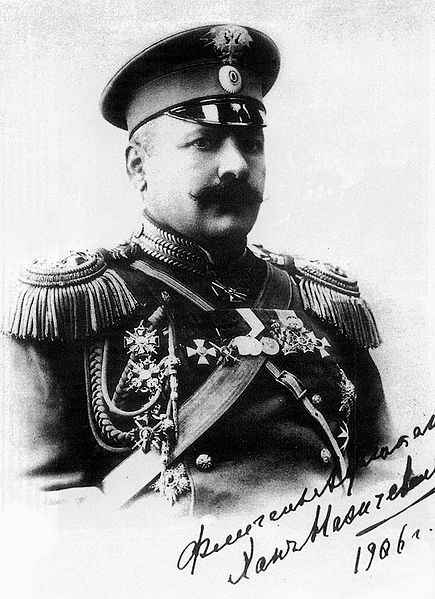<Back to Index>
- Astronomer Charles Dillon Perrine, 1867
- Poet Jacopo Sannazaro, 1458
- General of the Cavalry Huseyn Khan Nakhchivanski, 1863
PAGE SPONSOR

Huseyn Khan Nakhchivanski, francised spelling: Hussein Nahitchevansky (Azerbaijani: Hüseyn xan Naxçıvanski; Russian: Гусейн-хан Нахичеванский or Хан-Гуссейн Нахичеванский) (28 July 1863, Nakhchivan City – January 1919, St. Petersburg), was a Russian Cavalry General of Azerbaijani origin. He was the only Muslim to serve as General - Adjutant of the H.I.M. Retinue.
He was born on July 28, 1863 in Nakhchivan City (now the capital of the Nakhchivan Autonomous Republic in Azerbaijan). His paternal grandfather Ehsan Nakhchivanski was the last ruler of the Nakhchivan Khanate. Huseyn Nakhchivanski's parents were Kalbali Khan Nakhchivanski, a major - general in the Russian Army, and Khurshid Qajar-Iravani, member of the royal family of the Erivan khanate (abolished in 1828).
In 1874, Huseyn Nakhchivanski was admitted to the Page Corps and graduated with honours in 1883. He received the rank of cornet and was assigned to the elite Leib Guard cavalry regiment. Nakhchivanski served there for twenty years and ascended positions from cornet to Colonel of the Leib Guard.
When the Russo - Japanese War broke out in 1904, Huseyn Khan was seconded to Petrovsk - Port to form from volunteers the 2nd Dagestani cavalry regiment. During the war the regiment distinguished itself, and Khan Nakhchivanski himself received seven decorations. On January 27, 1907 he was decorated with a fourth - degree Order of Saint George for launching a successful cavalry onslaught to save an encircled Russian infantry unit. He was also awarded the golden Saint George sword.
Khan Nakhchivanski was the commander of 44th Nizhegorodski Dragoon regiment from November 1905, and in 1906, he was made Fliegel - Adjutant and
appointed the commander of Leib Guard cavalry regiment, where he
started his military career. In 1907, he received the rank of major - general and joined H.I.M. Retinue. In 1912, he was appointed the commander of 1st detached cavalry brigade, in 1914 he was conferred the rank of lieutenant - general and made the commander of 2nd cavalry division and in this position entered World War I.
In August 1914, Khan Nakhchivanski was the head of the cavalry group on
the right flank of 1st army. From October 19, 1914 he was commander of
the 2nd cavalry corps and on October 22, 1914, he was decorated with the Order of Saint George of III degree, which was presented to him personally by Tsar Nikolas II. In June 1915, he was appointed General - Adjutant of His Imperial Majesty and became the only Muslim to
hold that position. On November 25, 1915, Huseyn Khan was seconded to
the chief commander of the Caucasian Army and on January 23, 1916 he
was promoted to the rank of the General of the Cavalry. He was the commander of Guard Cavalry Corps from April 9, 1916 and took part in the Brusilov Offensive. When in the winter of 1917 the February Revolution began in Petrograd (present day Saint Petersburg), Nakhchivanski was one of the two Russian generals who supported the Czar and sent a telegram to the headquarters of the Supreme Commander - in - Chief to offer Nicholas II the use of his corps for suppression of the revolt, but Nicholas II never received this telegram. After the abdication of Nicholas II, Khan Nakhchivanski refused to serve the Russian Provisional Government,
retired from the army and lived with his family in Petrograd. He was
one of the few Azeri figures who didn't support the newly formed Azerbaijan Democratic Republic, remaining a staunch Russian monarchist. After the October revolution and the assassination of the head of Petrograd Cheka, Moisei Uritsky, Nakhchivanski together with some other prominent citizens of Petrograd was taken hostage by the Bolsheviks and executed in the Peter and Paul Fortress in
January 1919. Details about Nakhchivanski's last days, including the
exact date of his execution, had not been disclosed until the late 20th
century, when French historian Jacques Ferrand published his book Descendances naturelles des Souverains et Grands Ducs de Russie de 1762 à 1905, where he presented these facts as per Nakhchivanski's émigré descendants.
Ca. 1890, Nakhchivanski married Sophia Taube (née Gerbel; 1864, St. Petersburg – 1941, Beirut), daughter of the Russian poet and translator Nikolai Gerbel.
Together they had three children: Nicholas (died in 1912), Tatiana and
Georges. After the October Revolution, the Nakhchivanskis emigrated.
Their descendants lived (and some continue to live) in France, Lebanon, Egypt, and the United States.
Nakhichevanski is also mentioned in Aleksandr Solzhenitsyn's historical fiction about the Battle of Tannenberg entitled August 1914.